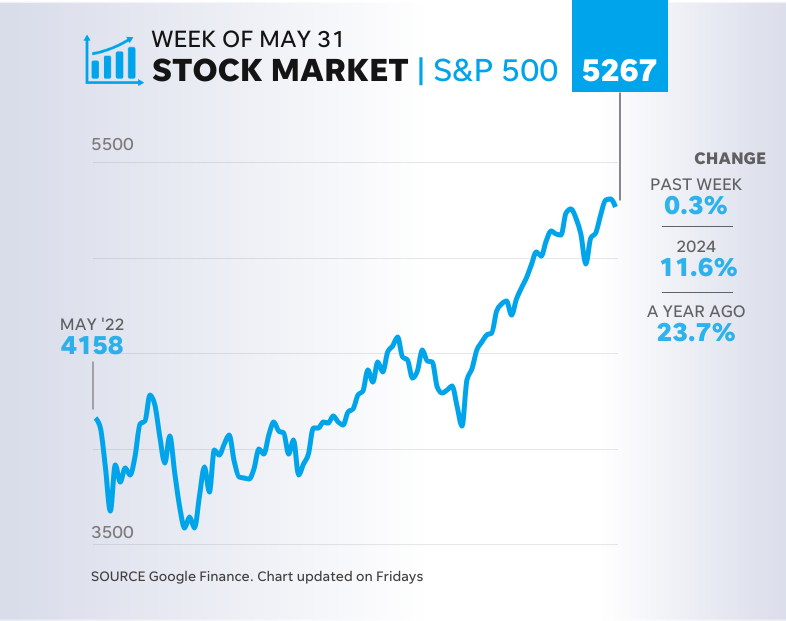Stock splits make Nvidia and Chipotle shares more affordable. Should you buy them?
Stock splits are hot with companies like Walmart, Nvidia and Chipotle, each announcing one this year so more people can afford to buy their shares. But should you?
It depends on whom you ask.
Some analysts say stocks that split tend to outperform the broad market S&P 500 index in the 12 months following the split announcement. Others say a stock split isn't a reliable indicator of whether a stock's value will increase or decrease over time.
It's not necessarily the split that makes the stock's price rise, said Peter Ricchiuti, senior professor of practice at Tulane University’s Freeman School of Business. “Stocks splitting are companies that are doing very well so it’s natural the stock will continue to go up,” he said.
How do stock splits work?
There are two kinds of stock splits:
◾ Forward splits decrease the share price and proportionately increase the number of shares outstanding. They usually occur in ratios. For example, a 2-for-1 stock split means a shareholder would own double the number of shares, each worth half as much, so your investment value remains the same.
When people talk about “stock splits,” they’re typically referring to these. They’ve dominated this year, with Nvidia, Broadcom, Walmart, Chipotle and William Sonoma among them.
◾ Reverse splits increase the share price and proportionately reduce the number of shares outstanding, so your investment is unchanged. For example, in a 1-for-4 reverse split, every four shares become one post-split and then priced four times higher.
What does performance data show for stocks that split?
Splits have generally been bullish for companies that have them, with average one-year returns from the date of the split announcement of 25%, or double the broad market, said Jared Woodard, Bank of America investment and ETF strategist.
“Splits have boosted returns in every decade including the early 2000s when the S&P 500 struggled,” he said in a report.
Other analysts say shares generally only benefit briefly off the news of a split, rather than over time.
“Stock splits appear to exhibit behavior that would encourage investors to 'buy the announcement, sell the split' as after splits took effect, no pattern of outperformance was visible,” said George Smith, portfolio strategist at LPL Financial.
Smith cited a Goldman Sachs examination of 45 splits of Russell 1000 stocks since 2019 that showed stocks only outperformed the equally weighted S&P 500 index by an average of 4% during the week following the split announcement. After that, there wasn’t any reliable pattern of gains.
Nvidia splits: Nvidia stock rises in first trading day after 10-for-one split

Why do companies split their stock?
Companies split their stock to cut their share prices so more people can afford to buy them. People may be more apt to buy a share of Chipotle for about $64 instead of more than $3,200 after its 50-for-1 stock split, for example, even if they can only buy fractional shares.
With more people trading that stock, liquidity increases. Liquidity makes it easier to buy and sell the stock, in general. Companies and big institutional investors will be able to purchase shares at a lower cost since large orders have less impact on a more liquid security.
Should you buy or sell stocks that split?
In the short term, most analysts seem to agree that a stock slated to split may get at least a small bump up, although some say it’s debatable exactly what causes the rise.
Buying stock: What are the best stocks for new investors?
“It’s worth remembering that many stock splits are announced in conjunction with earnings, so attributing the driver of stock moves between the split and the earnings is difficult,” Smith said.
Longer-term, many factors can affect a stock’s price. Woodard’s data show split stocks usually outperform the broader stock market, but he also noted “outperformance is no guarantee. Stocks see negative returns about 30% of the time 12 months later.” He said the average decline is 22%.
A challenging economy can also suppress stock gains. “Companies like Amazon, Google, Tesla, and Dexcom struggled in the 12 months after splits were announced in 2022 as interest rates spiked,” he said. “Amazon is a good example of how stocks can recover, however, and was up 26% in the 24 months after its split announcement.”
What companies might be next to split?
If you’re a stock split believer, you’re probably wondering which companies will be next to announce a stock split.
Stocks with high share prices are typically prime candidates for split announcements. There are more than 30 stocks in the S&P 500 that have share prices above $500 apiece, with the most expensive stocks priced at more than $1,000, Woodard said.
The over $1,000 per share stocks include NVR, Booking Holdings, AutoZone, Mettler-Toledo International, Broadcom, Fair Isaac, and TransDigm.
But Jastra Kranjec at StockAnalytics.com has her eye on Facebook parent Meta.
“Unlike all the other companies in the Magnificent Seven group, Mark Zuckerberg’s company has never done a stock split, and many believe it`s on the verge of doing one,” she said. “Since its IPO (initial public offering) in 2012, Meta`s price has jumped more than 13 times, going from an initial $38 to over $505 last week, and is now the most expensive stock among the Magnificent Seven.”
Magnificent Seven refers to the group of high-performing tech stocks – Microsoft, Alphabet, Nvidia, Apple, Tesla, Amazon, and Meta.
Medora Lee is a money, markets, and personal finance reporter at USA TODAY. You can reach her at mjlee@usatoday.com and subscribe to our free Daily Money newsletter for personal finance tips and business news every Monday through Friday morning.
This article originally appeared on USA TODAY: Stock splits make a comeback. Should you buy into them?

 Yahoo Finance
Yahoo Finance 